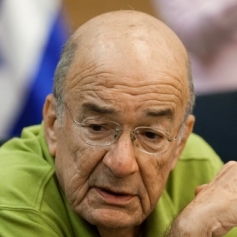
Israel

Yossi Sarid, eloquent man of conviction passes
WAYNE SUSSMAN
Sarid was a superb parliamentarian. When he entered the Knesset in 1974, he became a darling of the media. His fierce, principled attacks on those whose policies he disagreed with, and those whose values and integrity he questioned, were legendary.
He was former Finance Minister Pinhas Sapir’s right-hand man. He made an immediate impression on voters and on the Labour Party, and many saw this young prince as a future leader of Labour and a future prime minister.
For Sarid, principle was more important than position. In 1984, when Labour entered a government of national unity with Likud, the party who had been responsible for Israel’s incursion into Lebanon, he threw away that veritable ladder to the top and went into the political periphery and joined Ratz (a predecessor to Meretz).
Sarid knew his party would never be a majority party; he knew his opposition to the unity government would draw the wrath of most of those who held him in such high regard when he entered the Knesset.
He would lead Meretz and help the party win 10 seats in the 1999 election. He served in Yitzhak Rabin’s government as minister of environment and in Ehud Barak’s government as minister of education. He had a passion for education and made his mark in this portfolio.
I only met Yossi Sarid once – during the Lebanon War of 2006. I was travelling with Zev Krengel in the northern part of Israel. We happened upon moshav Margaliot.
We travelled up a winding, single track road, along the Lebanese border. The police told us to go to the bomb shelter. There we met with anxious residents, many of whom were of Kurdish descent.
I had never met Kurdish Jews before. During our halted exchanges, I found out that Yossi Sarid was a resident of the moshav. I was taken aback. Sarid was Ashkenazi, urbane, and a man of letters, and here he was living among those on the periphery of society, many who would certainly never even think of voting for his party.
I asked them why he was not at the bomb shelter. They said he was looking after the chickens. The police had now told us to either stay in the shelter or consider going back to the centre of the country. I said I am not leaving until I meet Yossi Sarid. Eventually, a convoy was arranged and we set off to find Sarid at the chicken coop.
My moment had arrived. I would get to meet Sarid. As we got out, a Katyusha rocket landed about 50m from us. The noise was deafening and the dust had enveloped our surrounds.
The policeman chaperoning us ordered us to return to the shelter immediately. I refused to miss out on my opportunity. I disobeyed him and walked to the coop. Out sauntered Sarid. Despite the fact that his chickens were almost turned into schnitzel, he was very nonchalant.
He told the policeman to relax and wanted to know what two guys from South Africa were doing in Margaliot. The more important question was, why was he not in a shelter. He retorted that the “chickens could not take care of themselves”.
Sarid was unapologetic about his love for his country, but he remained deeply concerned and critical about the occupation and settlement expansion and about the gap between rich and poor. He never became leader of Labour, nor did he become close to becoming prime minister, but then again, how many leaders, how many politicians would remain with the forgotten chickens and crops during a time of a national crisis?




